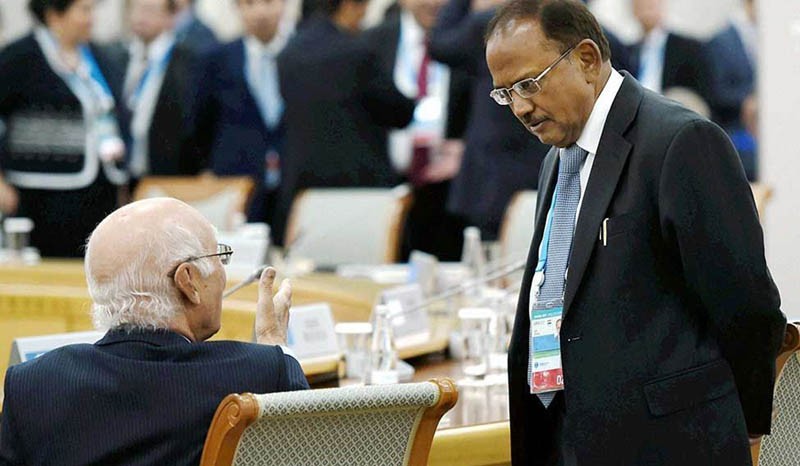
The NSA talks were stalled largely because of a different interpretation of Ufa statement by each side

There never were high hopes of the proposed National Security Advisors’ (NSA) meeting in New Delhi. However, the cancellation of that meeting shows the two nuclear neighbours are still not mature enough to agree to disagree.
The talks got stalled on non-agreement between the two countries over the agenda of the talks, largely because of a different interpretation of Ufa statement by each side; and on the issue of who the Pakistani NSA should or should not meet during his visit to Delhi.
Both countries have fought three wars over Kashmir which is a recognised dispute between the two countries. Indian government’s position is that it does not consider the group led by Syed Ali Geelani as representative of Kashmiris and thus a party to dispute between Pakistan and India. On the contrary, the government of Pakistan considers that group to be one of the representatives of Kashmiris, and thus a stakeholder in the Kashmir dispute. Both of them can stick to their positions but in order to move on they would have to avoid a lose-lose situation where a win-win is not possible.
Let us take the reaction to the proposed meeting of Sartaj Aziz with Syed Ali Geelani first. We are living in an era of communication dominated by endless opportunities to communicate through "voice over internet protocol" (VOIP). In the age of video link, blackberry messenger, WhatsApp, Skype, Facebook call, Google handout and so many other VOIP applications, in person meeting is not the only option to talk. If the Indian government has not blocked Syed Geelani and his supporters’ access to these communication tools, then theoretically speaking India cannot gain much by objecting to Pakistan High Commissioner in Delhi’s invitations to Geelani.
Academically speaking, the same argument applies to Pakistan as well. When a Pakistani statesperson, before coming to India, can have an online discussion with Syed Geelani (and make this information public to register that Pakistan continues to recognise his party as a legitimate stakeholder on Kashmir), inviting him in person to Pakistan High Commission Delhi is not always necessary.
Instead of making this symbolic courtesy call a matter of ego and prestige, the important thing is that both Pakistan and India stay firm on their stated positions and then enter in a dialogue with a view to avoid a no-win situation.
Having said that, political governments often have to take some steps to please their constituencies. If New Delhi thought a meeting between Sartaj Aziz and Syed Geelani would invite the opposition’s and media’s wrath and if Islamabad knew it couldn’t afford the criticism on Pakistani NSA visiting Delhi and not meeting Geelani, then both governments should have selected Islamabad as the venue of meeting. Ajit Doval’s visit to Pakistan would have avoided this controversy without any party losing its political mileage.
Now let us come to the controversy around the agenda of talks. The agenda turned controversial because of an ambiguous Ufa statement which had two distinct parts.
The first part says, "They (both Prime Ministers) agreed that India and Pakistan have a collective responsibility to ensure peace and promote development. To do so, they are prepared to discuss all outstanding issues. Both leaders condemned terrorism in all its forms and agreed to cooperate with each other to eliminate this menace from South Asia".
Kashmir is an outstanding issue between both the countries. From Pakistan’s perspective, "They are prepared to discuss all outstanding issues" implies discussion on Kashmir and other outstanding issues too. Thus Kashmir should have been an agenda item for any bilateral talks under Ufa statement.
The Indian Minister of External Affairs Sushma Swaraj terms the first part of the statement as "preamble" and builds her case, when she says that NSAs were only mandated to discuss all issues connected to terrorism, referring to the second part of Ufa statement which states;
"They also agreed on the following steps to be taken by the two sides: 1. A meeting in New Delhi between the two NSAs to discuss all issues connected to terrorism". This part includes four other steps including meeting of DG BSF/Rangers and DGMOs; release of fishermen; facilitation of religious tourism; and expediting Mumbai case trial.
Theoretically speaking, both interpretations can be valid. But I am bewildered at the state of denial of both India and Pakistan. Pakistan is committed to provide all diplomatic and moral support to the cause of Kashmir but it could never get the word "Kashmir" mentioned in the Ufa statement as an outstanding issue. On the other hand, India wants the NSAs talk to be confined to all issues connected to terrorism. It claims that militant separatist groups of Kashmir are supported by non-state actors of Pakistan and then contradicts itself by emphasising that discussion on Kashmir is beyond the mandate of NSAs talk. In other words, there is an official clean chit from India that Kashmir issue is not connected to terrorism.
Someone said, and I agree, that a discussion between Pakistan and India without Kashmir is like two enemies at war agreeing to talk about the illegality of using FedEx to ship weapons. They need to settle down and talk about what’s causing the war in the first place.
Since war is neither desirable nor affordable between the two nuclear neighbours, the leadership on both sides ought to give dialogue a chance. Instead of conducting each other’s media trial and point scoring at each other’s expense, it is about time both countries show maturity and instead of "cursing the illegality of using the courier company" address the root causes of the outstanding issues.